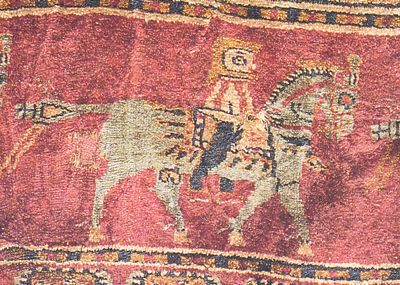Posted by R. John Howe on 09-24-2002 06:18 PM:
Frank But Not Preoccupied
Dear folks -
In another thread I have pointed to one instance I
knew of in which the sexual and reproductive imagery in a Turkmen weaving was
very explicit.
Not to argue against Fred's thesis here, but I have today
been looking through lots of rug books trying to find images that may be
instances of sexual and/or reproductive reference. And I have found some that I
will gradually put up. But the general impression this review has left with me
is that, while rug weavers sometimes seem frank about sex and reproduction in a
matter of fact way, they are also not preoccupied with these
themes.
Nearly all of the animal, bird and human images I have
encountered today in my rug books are NOT what the doll manufacturers call
"anatomically correct."
Clothing rather than sexual organs is usually
used to distinguish the sexes in human figures and the sex of the animals
depicted is usually not indicated at all.
Even in Tanavoli's little
catalog on "Lion Rugs From Fars," where the size of the lion images would
readily permit at least a hint of the sexual organs, the sex of the lions is,
in almost all of the cases where it is indicated at all, denoted by a mane
rather than by the suggestion of a penis.
Regards,
R. John
Howe
Posted by Steve Price on 09-24-2002 09:58 PM:
Hi John,
While it seems to be true that explicit depiction of the
genitals is the exception rather than the rule, it does go back a long way.
Here's one of the horses on the border of the Pazyryk rug.

All
the other horses on the border appear to be stallions, too.
Regards,
Steve Price
Posted by RMorris on 09-25-2002
09:04 AM:
hi all,
Given that at least in the language of their textiles
things are usually abstracted and symbolic, doesn't it make sense that
references to procreation etc. are going to be broken down into the same
symbolic language or codification rather than graphic depiction?
To me
this would make the presence of these references no less frequent but not
necessarily so obviously discernible. It might be that these few depictions we
are seeing are exceptions or even the tip of a more symbolic iceberg. The fact
is that in many worldwide tribal cultures there is a symbolic female language
taking place just as commonly as one where the components are laid out
obviously. It occurs in Navajo rugs, Southeast Asian jewelry, plains Indian
parfleche etc etc .
It seems discussions of textiles here bog down when
it comes to the old axe of the Goddess symbolisms but perhaps there is a more
mundane (everyday) language going on. There are certainly enough sustainable
proofs of women's amuletic language in other tribal cultures.
Randall
Morris
Posted by Vincent Keers on 09-25-2002 11:06 AM:
Rudolph
Hi John,
Our garden lion "Rudolph" doesn't show his
penis.
When he's acting masculine, he turns his bud? at me and shows me his
balls, looking back over his shoulder "You got'a problem?"
"You got'a problem?"
And because the
testicles aren't very far from the penis, the penis is hidden between the
legs.
Don't think I've ever seen a lion exposed from the back in any
textile.
Best regards,
Vincent
Posted by Fred Mushkat on
09-26-2002 04:13 AM:
Hi John,
I don't believe that the weavers of these bands and the
other textiles posted on the discussion boards in any way suggests a sexual
preoccupation. These were people who lived simply, and were not as restricted
by social taboos as much as their settled counterparts. Sex and reproduction
were facts of daily life, and took place with much less privacy than most
westerners tolerate. It is appropriate for a young woman weaving her dowry
rugs, bags and bands to place these reminders of the reproductive aspects of
life on her most important work.
Regards,
Fred
Posted
by R. John Howe on 09-26-2002 05:51 AM:
Fred -
Yes, that is my take too.
Someone said in an
earlier salon that they wondered about the lack of privacy that must have
obtained amongst tent dwellers.
I agreed saying that most conception
must have occurred within the hearing of others, especially since tents often
had parents and married children living together.
And as we have noted
already, as animal breeders, sexual activity in animals would have been
constantly in sight. This would likely result in the matter of fact frankness
that we see in the rug images.
I just started this thread because of my
experience when I started looking for sexual and reproductive images. I did not
hear any hint of a suggestion of preoccupation in your initial
essay.
Matter of fact, seems exactly right.
Regards,
R.
John Howe
Posted by Steve Price on 09-26-2002 06:27 AM:
Hi People,
I would add to what Fred and John have said by
pointing out that the depiction of genitals and the depiction of reproductive
or other sexual activity are related, but not the same thing.
Depicting
the genitals or other indications of gender is not unusual in many cultures,
showing sexual activity occurs in relatively few.
Regards,
Steve
Price
